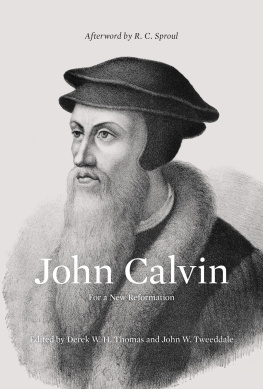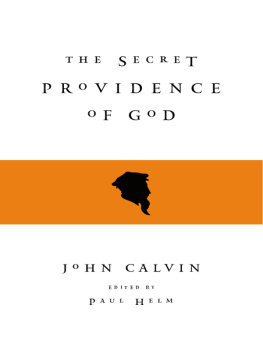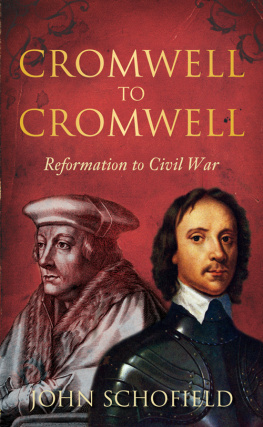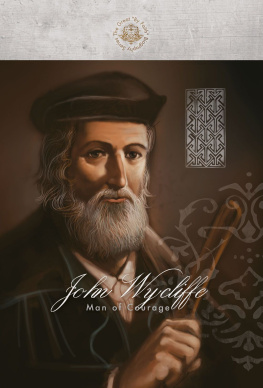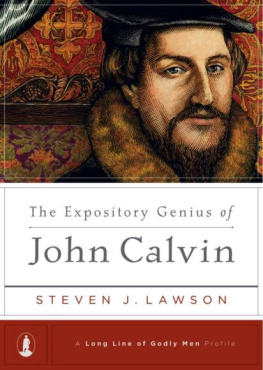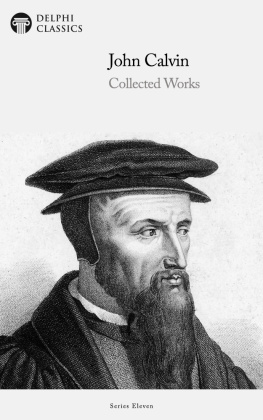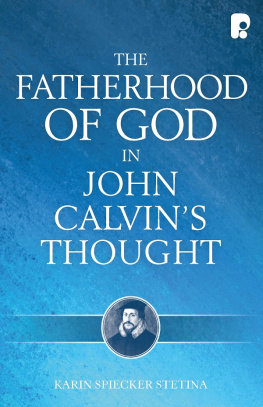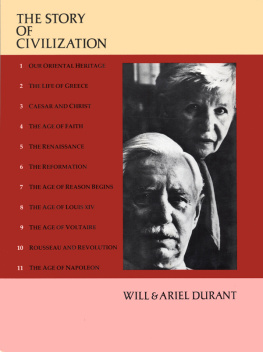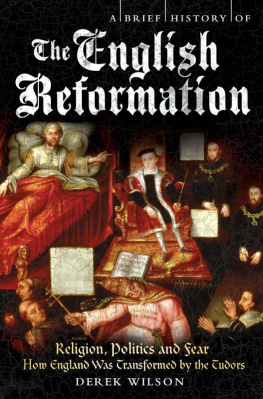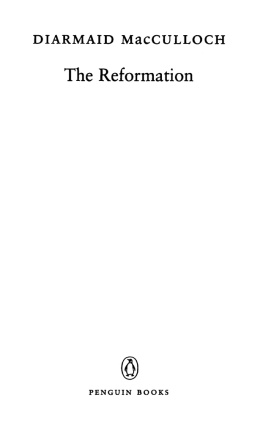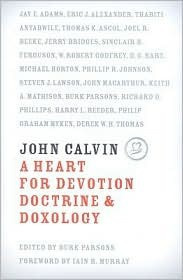Derek W. H. Thomas (editor) - John Calvin: For A New Reformation
Here you can read online Derek W. H. Thomas (editor) - John Calvin: For A New Reformation full text of the book (entire story) in english for free. Download pdf and epub, get meaning, cover and reviews about this ebook. year: 2019, publisher: Crossway, genre: Religion. Description of the work, (preface) as well as reviews are available. Best literature library LitArk.com created for fans of good reading and offers a wide selection of genres:
Romance novel
Science fiction
Adventure
Detective
Science
History
Home and family
Prose
Art
Politics
Computer
Non-fiction
Religion
Business
Children
Humor
Choose a favorite category and find really read worthwhile books. Enjoy immersion in the world of imagination, feel the emotions of the characters or learn something new for yourself, make an fascinating discovery.
- Book:John Calvin: For A New Reformation
- Author:
- Publisher:Crossway
- Genre:
- Year:2019
- Rating:3 / 5
- Favourites:Add to favourites
- Your mark:
- 60
- 1
- 2
- 3
- 4
- 5
John Calvin: For A New Reformation: summary, description and annotation
We offer to read an annotation, description, summary or preface (depends on what the author of the book "John Calvin: For A New Reformation" wrote himself). If you haven't found the necessary information about the book — write in the comments, we will try to find it.
John Calvin: For A New Reformation — read online for free the complete book (whole text) full work
Below is the text of the book, divided by pages. System saving the place of the last page read, allows you to conveniently read the book "John Calvin: For A New Reformation" online for free, without having to search again every time where you left off. Put a bookmark, and you can go to the page where you finished reading at any time.
Font size:
Interval:
Bookmark:
K. Scott Oliphint
But because the church recognizes Scripture to be the truth of its own God, as a pious duty it unhesitatingly venerates Scripture.
John Calvin, Institutes of the Christian Religion
The Alone Foundation
During the Reformation, there were two principles that served to define the importance of the movement itself. While these two principles were only part of the overall project as it progressed historically, they highlighted the central matters of conflict between the established church and those calling for its reform. The two principles were delineated as formal and material .
The formal principle of the Reformation provided the ground of authority, the structure and context for the material principle. The material principle was the doctrine of justification by faith alone. This was the central matter that needed to be clarified against the backdrop of the predominant theology of the church in the sixteenth century. The formal principle was summed up in the Latin phrase sola Scriptura Scripture aloneand was designed to call the church back to its sole ground of authority. It was meant to emphasize again the necessity of Scripture as the only foundation on which all matters of theology were to be based.
It would be difficult to overestimate the importance of John Calvins theology in this movement. His prolific outputin his commentaries, the Institutes , and his miscellaneous letters and treatisesforms the centerpiece of what became the central tenets of Reformed theology. Specifically, for our purposes, Calvins insight into the nature and function of Scripture provided the catalyst for all things Reformed coming after him. Our focus in this chapter is to highlight some of the most salient points that Calvin develops as he calls the church back to a proper (i.e., biblical) view of Scripture.
To think about the importance of Scripture in Calvins Institutes , we must first attend to some preliminary matters. We should look initially at the context of his discussion of the doctrine of Scripture. That is, the reason why Calvin organized his topics in the way that he did says something about our particular topic. So we must say something briefly about Calvins design as he wrote the Institutes .
After noting Calvins organizational rationale, we can then set out the particular context of his view of Holy Scripture. As we proceed, however, it might be helpful to offer two significant bookends to this topic that give it its proper context. The first bookend has to do with Calvins understanding of Gods general revelation to man. Given that Calvin is interested in explaining just how it is that we come to a true and proper knowledge of God, any exposition of Calvin on Scripture should at least summarize his view of the knowledge of God available through Gods revelation in creation. The second bookend, featured at the end of our discussion, comes in the century after Calvin in the Westminster Confession of Faith (1646). Because this confession gives us, in summary fashion, the gist of Calvins concerns with respect to Scripture, it is useful for us to conclude with it after we see Calvins own emphases with respect to a Reformed doctrine of Scripture.
Organization: Method and Structure
One of the primary purposes of Calvins Institutes is to develop and explicate a series of theological topics that would help and guide students of theology in their approach to Scripture.
The Institutes , in other words, contains the doctrinal elaborations that flow from the exegetical work that Calvin undertook in his commentaries.
So the first point to be made with respect to our particular topic is that while Calvin no doubt refers to a number of humanist and Renaissance sources in the beginning sections of the Institutes , and while there are similarities at points between, for example, the arguments of the driving force behind the content and arguments set forth by Calvin resides in the order of argumentation set forth by the apostle Paul in Romans. This is an important interpretive point that must be kept in mind and one that is central to understanding what Calvin is saying and why he is saying it.
There can be no question that Calvin refers to Cicero and others in his elaboration of the sensus . However, to think that Calvins concept of that notion derives, in the main, from sources other than Scripture is to miss the point of Calvins argument.
The second contextual point, which goes hand in hand with the first point above, has to do with Calvins organizing structure in these initial chapters. Calvin states,
What must be kept in mind, however, is that while the duplex is important for Calvin, it is not the organizing structure of the beginning sections of the Institutes . That structure is articulated clearly in the first sentence of the Institutes :
Nearly all the wisdom we possess, that is to say, true and sound wisdom, consists of two parts: the knowledge of God and of ourselves.
Therefore, before proceeding to the overall duplex cognitio Dei , Calvin needs first to flesh out the relationship of our knowledge of God to our knowledge of ourselves. Hence, Muller states,
We now have before us two organizing principles that provide the backdrop for our understanding of Calvins doctrine of Scripture. We take for granted that behind all that Calvin is saying in the opening chapters of the Institutes is the apostle Pauls discussion in Romans, and that at the heart of Calvins concern in these initial chapters is the relationship of our knowledge of God to our self-knowledge.
How then does Calvin initiate the training of theological students in these beginning chapters? What matters are central and important for Calvin if his readers are to think biblically about the relationship of our knowledge of God and man? These seem to be the central questions to ask as we look at Calvins argumentation.
Nearly All the Wisdom We Possess
We should not pass over too quickly the radical and penetrating way in which Calvin begins the Institutes with his discussion on the knowledge of God and of ourselves. Romans), what we have in the initial chapters of the Institutes is the foundation for a Reformed Christian apologetic.
According to B. B. Warfield (speaking of Calvin),
In other words, the Institutes is for Calvin an apologetic. It is more than that, but it is clearly no less than that. It is meant to provide for the church the structure in which one can defend the true, biblical faith against errors. In that way, Calvins concerns were aimed at the destruction of strongholds that were raised up in his time against the knowledge of God (cf. 2 Cor. 10:5). His chosen organizational method provided the Protestant church a rich and deep foundation from which a Reformed apologetic could be developed.
To highlight the apologetic aspect of these initial discussions in the Institutes , we provide a brief overview of Calvins view of Gods revelation in nature and then set our sights on three crucial topics that he emphasized with respect to a Reformed doctrine of Scripture. These three topics were not the only ones that Calvin dealt with. They were, however, central to his defense of a theology that had its foundations in Scripture. Because of his concern to address the errors of the church, Calvin was forced to confront the issue of ultimate authority, a matter of fundamental importance in the Christian culture of his time.
But that question is no less important in our own time. Even though Calvins context and time were quite different from ours today, the issues he addressed and the answers he provided transcend that context and time (because they are biblical answers), and thus they remain crucially relevant to us today. As a matter of fact, with respect to apologetics, the argument could plausibly be made that the issue of ultimate authority is the issue that must be addressed by us all, Christian and non-Christian. Moreover, just how we begin to address this matter goes a long way toward demonstrating where our ultimate allegiance lies. This was Calvins concern; it is our present concern as well.
Font size:
Interval:
Bookmark:
Similar books «John Calvin: For A New Reformation»
Look at similar books to John Calvin: For A New Reformation. We have selected literature similar in name and meaning in the hope of providing readers with more options to find new, interesting, not yet read works.
Discussion, reviews of the book John Calvin: For A New Reformation and just readers' own opinions. Leave your comments, write what you think about the work, its meaning or the main characters. Specify what exactly you liked and what you didn't like, and why you think so.

